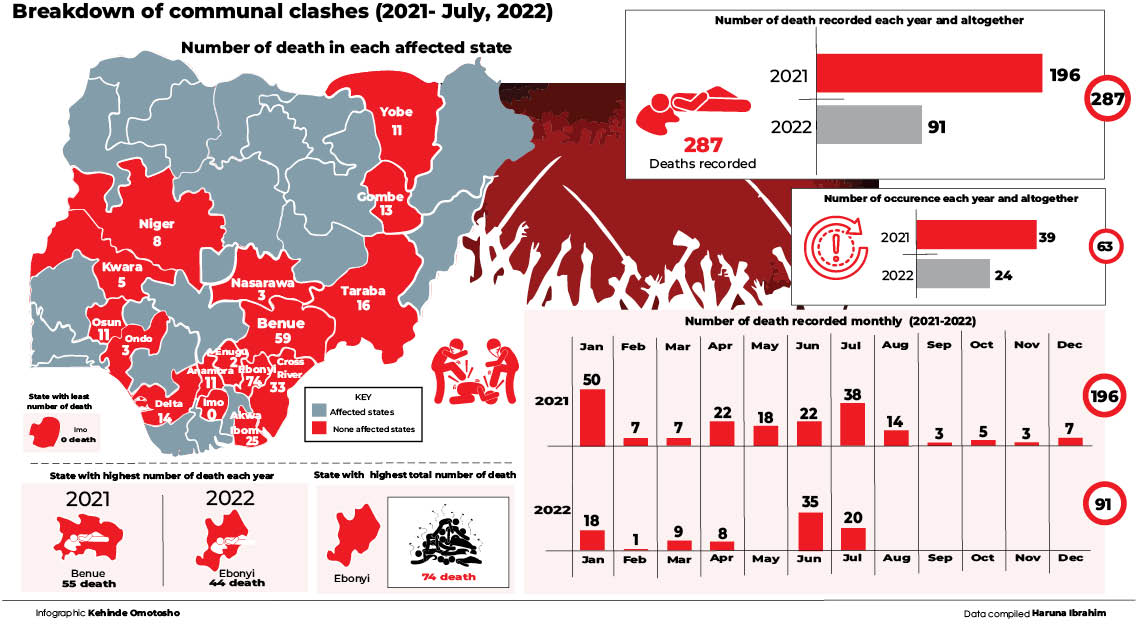The horrors of the grave closed in on no fewer than 25 people during the armed communal fighting between Effium and Ezza Effium communities of Ohakwu Local Government Area in Ebonyi State on January 21, 2021. The incident also led to the burning down of 125 houses, according to media reports.
Governor Dave Umahi, who confirmed the incident, attributed the conflict to lingering hostilities between the two feuding communities.
- Kano gov’ship: Declare me PDP candidate, Abacha tells INEC, PDP
- 2023: Peter Obi hasn’t studied Labour Party manifesto – Ajulo
“Officially, we have recorded about 25 deaths. Over 26 arms were recovered from the hoodlums. About 125 houses were burnt, and fuel and gas stations were damaged. I have written to the minister of humanitarian affairs and disaster management to come to our aid. I have also written to the National Emergency Management Agency (NEMA) for the same purpose,” Umahi was quoted as saying.
Curiously, Umahi reportedly blamed his commissioner for local government, Samuel Okoronkwo, and his special assistant, Emmanuel Igwe for the armed conflict.
The decades-old communal fighting between the two communities is said to have displaced thousands of people, including women and children in the area.
In another spectre of violence that visited the South East state on July 2 this year, 15 persons reportedly lost their lives in a communal crisis between the people of Ngbo and Ezza in Nkwuada community in Ohaukwu Local Government Area.
The clash was said to be linked to an alleged killing of a native of Nkwuada by the Ezza settlers. The deceased was accused of having killed a cow belonging to an Ezza indigene.
Elsewhere in the Gbadafu ward of Gbako Local Government Area of Niger State, three people were reportedly killed on July 10, 2022 in a violent communal clash between Biramafu and Evungi villages.
The conflict was said to have erupted as a result of speed breakers mounted by residents of Biramafu on the road that connects their village with other communities on the Bida-Mokwa highway.
In Anambra State, there was a renewed land dispute between Aguleri and Umuleri, both in Anambra East Local Government Area, on January 16, 2021 when a 95-year-old man, identified as elder Nnake Chibuzo, purportedly led his Ikenga Umueri community in a protest against Aguleri.
In the ensuing crisis, five persons were said to have lost their lives while properties worth millions were destroyed.
Checks revealed that the two communities had been at daggers drawn over a protracted land dispute that led to the loss of hundreds of lives and property worth millions of naira for a period of 20 years. Despite bonding blood ties, the two communities have continued to live in a manner that clearly shows that they are against each other.
In Cross River State, four persons were reportedly killed, while over 40 houses were said to have been destroyed in another communal crisis involving the people of Alok and Abankang communities of Ikom Local Government Area between January 5 and 8, 2021.
The feuding communities, both located along the Ikom-Ogoja highway in the central district of the state, are said to have been engaged in a protracted argument over the ownership of a parcel of land between their boundaries, which led to a clash.
Following the incident, Senator Sandy Onor, representing Cross River Central in the National Assembly, called on the people of the two communities to embrace peace.
Onor, who made the call when he visited both communities in the aftermath of the clash, reportedly urged the people to sheathe their swords in the spirit of brotherliness.
“I have read about wars, even big wars like world wars. I just came as your senator, somebody you people voted for, to say please, let there be no more war,” he was quoted to have said.
In Agatu Local Government Area of Benue State, 11 people were reportedly killed in two separate incidents in January 2021. A week earlier, gunmen were said to have attacked and killed 27 people in the Odugbeho community.
Elsewhere in Nasarawa State, no fewer than three persons were reportedly shot dead in the Odenigida ward of Udege Development Area in a land dispute that broke out in the area on March 13, 2022. The incident was also said to have led to the loss of lives and property worth millions of naira as the two communities were said to have engaged each other in a long battle over the ownership of a historical land.
In Taraba State, eight people were reported killed and property worth millions of naira destroyed while thousands of others were displaced in Bisaula and Gwanda communities following a communal clash between Ichen and Daka people in Kurmi Local Government Area on January 21, 2022.
It was reported that trouble started earlier in December when Ndaka people made attempts to install another village head in Bisaula but were resisted by the Ichen people, who claim to be the original inhabitants of the area.
Harvest of deaths
The incidents cited above are among a total of 51 reported cases of communal crises that occurred in different parts of the country between January 2011 and July this year. A total of 287 lives were lost during the incidents, while properties, including houses, running into hundreds of millions of naira, were reportedly destroyed. Many victims were injured.
While 38 incidents were recorded in 2021 that claimed 196 lives, a total of 24 incidents have so far been recorded between January and July this year (2022), in which 91 people were reportedly killed.
The incidents were reported in 15 states, namely, Cross River, Anambra, Akwa Ibom, Ebonyi, Niger, Delta, Osun, Gombe, Kwara, Benue, Enugu, Taraba, Nasarawa, Imo and Yobe.
A breakdown shows that Benue State (North Central) had the highest number of deaths (57) from 9 incidents that were reported in Okpokwu, Makurdi, Gwer-East, Gwer-West, Agatu, Ado and Konshisha local government areas. Four of the incidents occurred this year while five were recorded in 2021.
This was followed by Ebonyi State (South East), which recorded 44 deaths from seven incidents that occurred in Onicha, Ikwo, Izzi, Ohaukwu and Afikpo North local government areas. While two of the incidents were recorded last year, five reportedly occurred this year.
Akwa Ibom (South South) recorded 30 killings from eight incidents within the period in review, while Cross River recorded 24 killings from eight incidents.
Our survey further shows the pattern of killings as follows: Delta State (20 deaths), Taraba (16), Gombe (16), Anambra (11), Imo (13), Niger (8), Osun (6), Kwara (5) and Enugu (2).
According to analysts, ethnic cleavages have been a major factor that has ignited ethno-religious crises in different parts of Nigeria over the years.
Some of the prominent communal conflicts that occurred in different parts of the country in the past include Ife-Modakeke in Osun State; Yoruba-Hausa in Shagamu, Ogun State; Eleme-Okrika in Rivers State; Zango-Kataf in Kaduna State; Tiv-Jukun in Wukari, Taraba State; Ogoni-Adoni in Rivers State; Chamba-Kuteb in Taraba State; Itsekiri-Ijaw/Urhobo in Delta State; Basa-Egbura in Nassarawa State and the Hausa/Fulani-Sawaya in Bauchi State.
While these crises have variously led to loss of lives, displacement of people and destruction of properties, some conflict scholars say the greatest challenge facing the process of conflict resolution in Nigeria is the issue of maintaining balance and peacemaking among the conflicting parties by a third party, specifically the Nigerian government.
Social media, climate change, others responsible – Prof Pate
Professor Umaru Pate, the vice chancellor of the Federal University, Kashere, has identified some factors responsible for the rise in communal conflicts in Nigeria.
Pate, who spoke with Daily Trust Saturday in a telephone interview, said that aside the politicisation of issues, climate change and collapse in the local government system, the social media, as well as weapons proliferation, were among the factors responsible for increasing incidents of communal conflicts in the country.
“Communal conflicts are not new in Nigeria; they have been occurring over time, but in the past, they were better handled.
“Resources like land, water and others are major sources of war. Climate change, occasioned by population rise, has also led to scarcity of natural resources, thereby contributing to the escalation in communal conflicts.
While identifying what he termed the collapse in local government systems across the states in Nigeria as another factor, Pate said, “In the past, they were better handled, but now, there is a vacuum as traditional rulers do not have the required strength to manage the crises.”
According to the university don, the social media, combined with poverty, has also never helped matters, especially through the spread of hate speech.
“When people are poor they are desperate and become easy tools in the hands of mischief makers. Our elites need to wake up to manage our diversity and complexity in order to douse communal tensions,” he said.
Fidelis Mac-Leva & Haruna Ibrahim

 Join Daily Trust WhatsApp Community For Quick Access To News and Happenings Around You.
Join Daily Trust WhatsApp Community For Quick Access To News and Happenings Around You.


